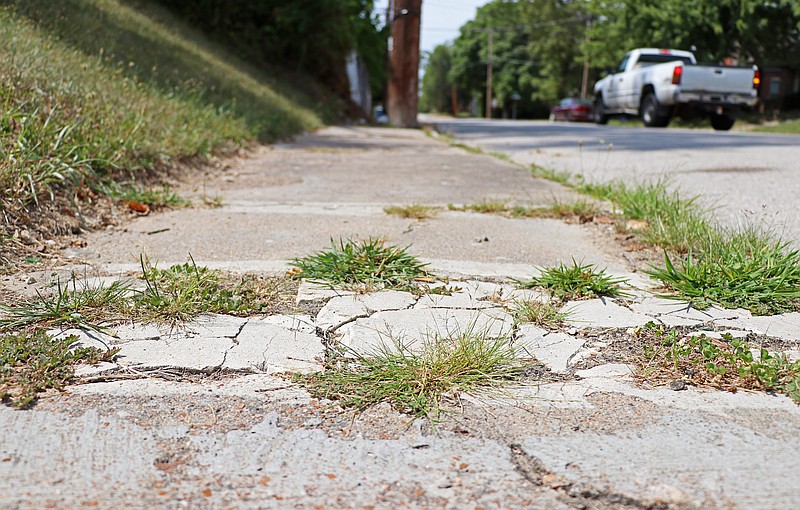When a sidewalk is covered in snow or contains a displacement that causes people to trip, most look to the city to address these issues. What many people don't realize is the adjoining property owners in Jefferson City are required to maintain the sidewalks.
Currently under city code, adjoining property owners are required to repair and maintain sidewalks, whether that be clearing them of snow or ensuring they are level.
Last week, the Jefferson City Council reviewed an amendment to the city code that clarifies the city's expectations of property owners and changes the vertical displacement allowed within sidewalks. The council will vote on the proposed bill Aug. 19.
The proposed amendment states owners of adjoining properties must repair defective sidewalks, which could be caused from cracking, spalling, deterioration, heaving or subsidence. In the case of utility work or other construction, those employees would have to repair the sidewalks.
If utility work, construction or defective sidewalks require sidewalk ramps, the owner or those undertaking the utility or construction work must construct a sidewalk ramp, according to the proposed bill. If an existing sidewalk ramp is impacted due to defective sidewalks, utility work or construction, it must be repaired or rebuilt, it adds.
Having adjoining property owners maintain the sidewalks is not a new thing for Jefferson City, said Britt Smith, city operation director. That requirement has been in place for several decades, he said, but was unsure the exact date it was adopted by the City Council.
Most sidewalks are located on public rights-of-way within the city, but the sidewalks are technically not city property. Rights-of-way are owned by the public, Smith and City Counselor Ryan Moehlman said.
The city owns the rights-of-way under the form of fee in trust, which is when "someone owns a piece of property but owns that property in trust for the benefit of the public," Moehlman said.
"When people say public rights-of-way are owned by the public, that's what it is," he said. "It is owned by the city, but not for the city. It is owned by the city for the public."
As the owner in fee in trust, the city is responsible for maintaining the rights-of-way in a safe condition, Moehlman said, but the city can delegate that responsibility to the adjoining landowners. This is why the city requires property owners to shovel snow off sidewalks and repair sidewalks if they are defective or have a vertical displacement.
The proposed bill presented to the City Council last week will require adjoining property owners to repair sidewalks when a vertical displacement of a quarter of an inch exists within any sidewalk. City code currently allows an offset of 1.5 inches.
Residents can remove vertical displacements by grinding or cutting the sidewalk to a slope if the displacement is less than 1 inch, the proposed amendment notes.
Smith recommended property owners use an angle grinder to address small vertical displacements.
"Just about anybody can run an angle grinder," Smith said. "It's not like it's a big heavy piece of equipment. We're not talking about a lot of money, but it would take time."
Smith said he understood if some property owners did not want to buy angle grinders and suggested they contact contractors. He added that option could be more expensive, though.
City staff proposed the change so it can match with federal requirements.
Federal requirements for pedestrian facilities in the public right-of-way states vertical surface displacement can be a maximum of a quarter-inch, according to the proposed bill. The federal requirements add vertical surface displacement between a quarter of an inch and a half-inch must be beveled with a slope not steeper than 50 percent.
Residents can still bevel displacements larger than a half-inch, but the slope must be at a shallower angle, Smith said.
"People who can't lift their feet very far, it's to keep them from catching their toe," Smith said. "It's very much safety and also for wheelchairs. When you're in a wheelchair, it can be hard to get that wheelchair to negotiate that bump when it's more than a quarter-inch but if you were to (slope it slightly), a wheelchair could roll up and over it if it's only a half-inch rise. If it's much more than half an inch rise, it needs to be laid back more so the wheelchair can negotiate it."
If the council approves the bill, several sidewalks that currently comply with city code would no longer be compliant. Smith said he was unsure how many sidewalks would be out of compliance.
There are roughly 250 center-line miles of street in Jefferson City, Public Works Director Matt Morasch said, and there are approximately 100 miles of sidewalk.
City staff does not know the fiscal impact, the bill notes. There may be a spike in enforcing this part of the code if it changed though, Smith said.
Currently, the city learns of sidewalk displacement issues if someone complains about it or trips over the displacement, Smith said. The city has occasionally been sued by individuals who tripped over displacements in the sidewalks, he added.
Smith said these incidents do not occur often, adding sidewalk trip complaints happen maybe two times a year.
While many other communities have the same model as Jefferson City, Smith said, he knows there are other communities that maintain the sidewalks.
If the city were to do that, it would need to find a funding source, Smith said.
"It's more than just the offset but it's snow removal, everything else," he said. "People have a duty to shovel the snow off the sidewalk in front of their property. If they wanted to change that and put that duty on the city, we would either need to come up with additional tax money to do it or say we're not going to do something so we can do that. It's all a matter of priorities."

